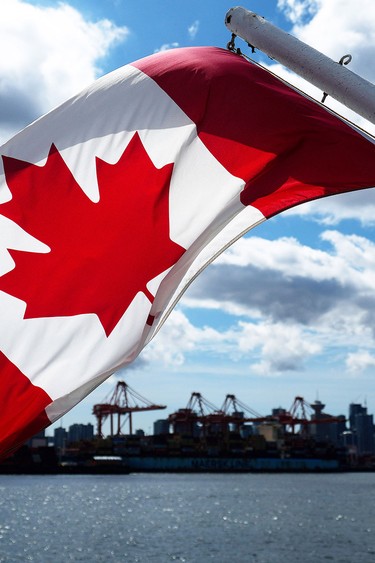More than 80% of newcomers who arrived in the past decade say Canada is too expensive
Article content
More than 80 per cent of newcomers who arrived in the past decade say Canada is too expensive to live in as they try to establish themselves amidst rising costs and employment-related obstacles, according to a new survey.
Nearly half of the roughly 2,100 newcomers interviewed by research group Leger Marketing Inc. said Canada turned out to be “significantly more expensive” than they expected, while 35 per cent said that it was “somewhat more” expensive.
Advertisement 2
Article content
Article content
Despite feeling the pinch, more than 80 per cent of the study’s respondents said they felt welcome in Canada.
“There’s no question that newcomers are at a degree of financial risk that is greater than the financial risk of established Canadians,” said Ian Large, Leger’s executive vice-president of consumer insights. “But (the survey suggests) they are still managing to establish themselves personally, professionally and financially.”
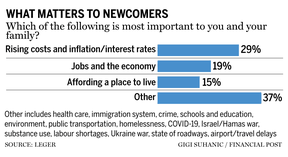
Canada relies on immigrants to boost its economy and replace its aging population. But record population growth in the past two years in the midst of a housing crunch has led economists and think tanks to urge Ottawa to provide more clarity on how it plans to accommodate hundreds of thousands of newcomers every year.
This is the first time Leger, which frequently measures the country’s sentiment on different issues, has conducted a survey involving such a large group of newcomers, a section of the population that is often missed in its general public surveys, Large said.
It takes an average of about 20 months for newcomers to become self-sufficient and able to cover their living expenses such as housing, food, health care and transportation without external support, the survey said.
Article content
Advertisement 3
Article content
That figure falls to 12.6 months for immigrants who arrived in Canada in the past five years, but rises to 25.1 months for those who have been in the country for six to 10 years. Large said this shows how rising prices could have lowered expectations of newer arrivals.
“I think what’s happened is there has probably been a change in attitude about what being financially self-sufficient looks like,” he said. “Maybe when (newcomers) arrived 10 years ago, financial self-sufficiency meant owning a home and now it means having a place to live and just paying rent.”
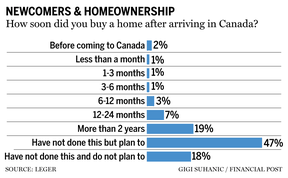
About 31 per cent of the respondents currently own the place they live in, while the rest either rent or live with family or friends. This increases to about 47 per cent for immigrants who have been living in Canada for six to 10 years.
“That’s very low,” Large said. “It’s a little bit counter to the narrative that all the foreigners are coming in and buying our houses.”
Newcomers were also asked if they could ever cover an unexpected expense of $500 without borrowing or selling: 60 per cent said yes, which is lower than the overall Canadian figure of 74 per cent, according to a Statistics Canada survey.
Advertisement 4
Article content
The Leger survey also shed some light on the kinds of services that newcomers look for from their banks or financial institutions. They include newcomer-specific financial products, assistance with building a credit history and multilingual services.
Large said newcomers are more likely to switch to a financial institution that provides them with a tailor-made approach, but that banks haven’t been creative enough to utilize this opportunity.
“They need to build relationships with the softer stuff,” he said. “Build relationships with the community. Don’t sponsor Oprah and hockey (for example), sponsor cricket or the local food drive. That’s where the community lives.”
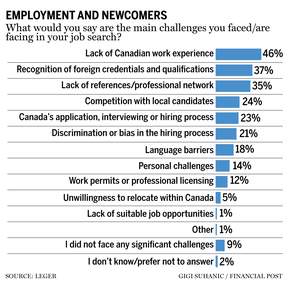
The survey also highlighted some of the more common problems that continue to hurt newcomers. The lack of Canadian experience is still the main challenge immigrants face during their job search, followed by employers’ lack of recognition of foreign degrees, and the lack of references and professional networks.
The overall message, according to Large, is that despite all the headwinds newcomers face — from trying to establish credit to finding a job — they are steadily working their way to establish their foothold in the economy.
Recommended from Editorial
-

Student caps may slow rent growth, but likely won’t fix housing: experts
-

What’s a population trap and how do you get out of it?
-

Immigration part of solution to housing crisis, minister says
“Despite all this … they are on a mission to establish themselves,” said Large.
But that doesn’t mean they agree with all of Canada’s immigration policies.
For example, 42 per cent said the nearly 500,000 immigrants Ottawa wants to bring in annually is “too many,” though 41 per cent agree with it or want to admit more, and the remaining 17 per cent preferred not to answer.
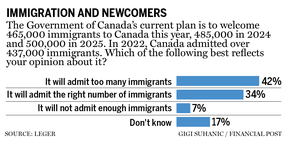
• Email: nkarim@postmedia.com
Article content
Most newcomers find Canada too expensive, survey says
2024-03-18 08:00:17






